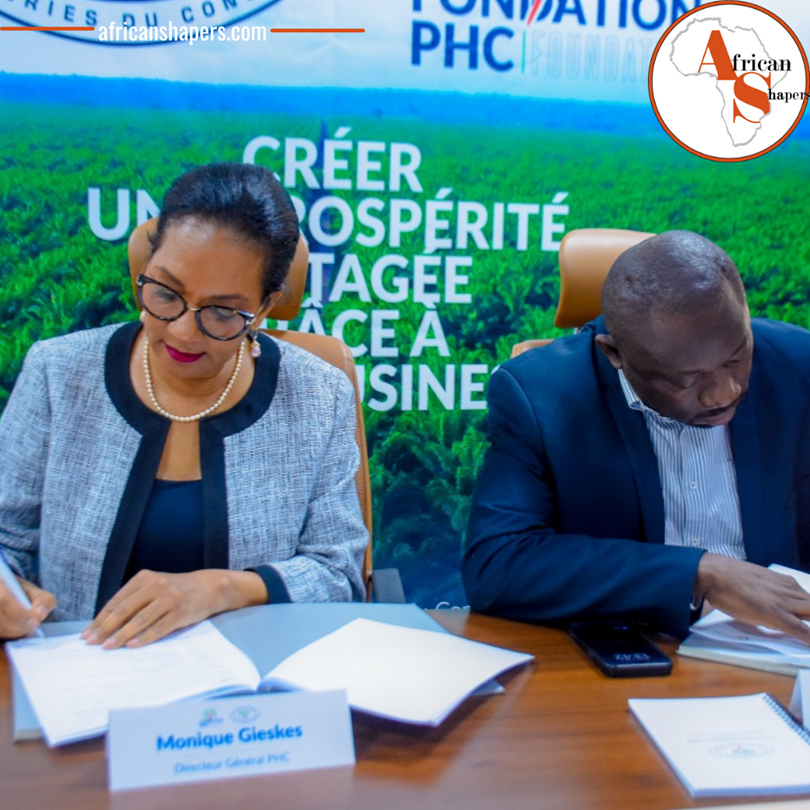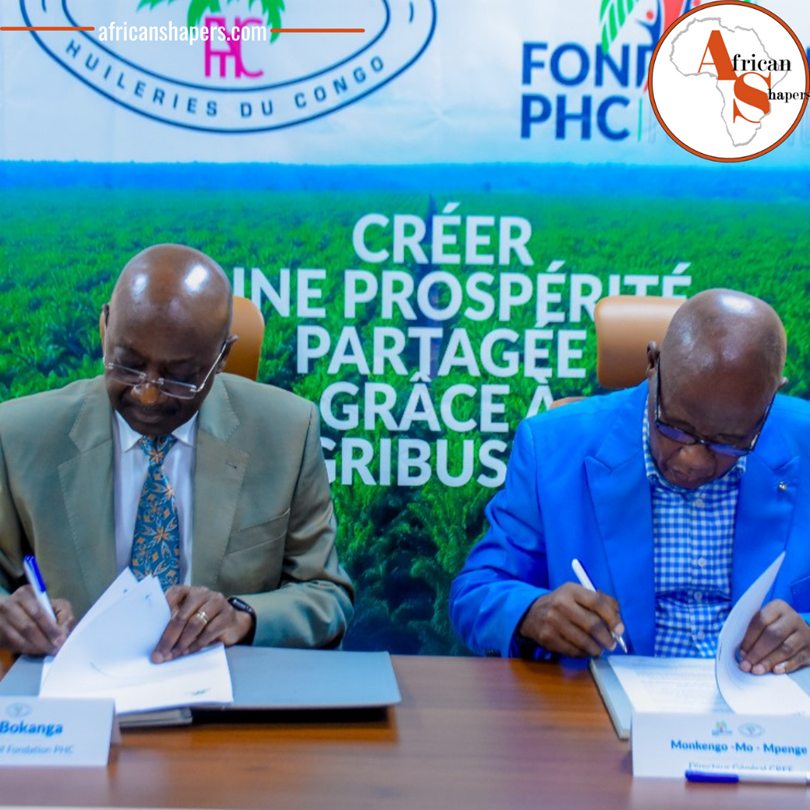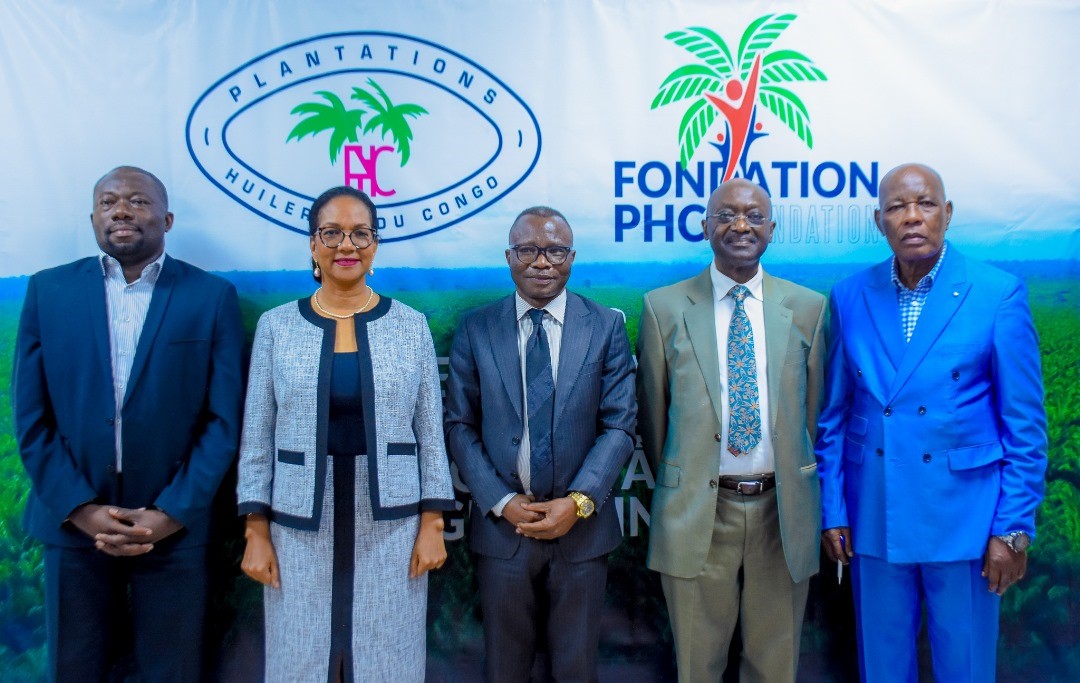PHC has announced, on October 16, the launch of the Bonobo project implemented by the PHC Foundation in partnership with the Centre for Research in Ecology and Forestry (CREF) and its commitment to green and inclusive growth. In this context, PHC has signed a memorandum of understanding with the organization SAVE TOMORROW, which will assist the company in the assessment of its carbon footprint and the formulation of implementation of a sustainable growth strategy.
PHC is partnering with two renowned partners, each recognized for its expertise. CREF is a national research center created in 1947 and with more than 50 years of experience in the scientific study of the Bonobo and the preservation of biodiversity in the Congo Basin. SAVE TOMORROW is a private organization specialized in promoting the commitment of Congolese companies to a sustainable economy.
The Bonobo Project: Protecting an endangered species and supporting communities
The Bonobo, whose genetic heritage is 95% identical to that of humans, lives only in the Democratic Republic of Congo (DRC), in an area of approximately 500,000 km2 completely circumscribed between the Congo River and the Kasai River. This 100% Congolese species represents both a global treasure for biodiversity and a major scientific heritage, contributing to a better understanding of human biology.
However, the species faces critical threats; it is listed on the Red List of Endangered Species of the IUCN (International Union for Conservation of Nature). The Bonobo is a victim of poaching and natural habitat destruction through practices such as slash-and-burn agriculture. Scientists predict that without immediate intervention, the Bonobo population will experience an irreversible decline, possibly leading to extinction of the species within the next few decades.

The Bonobo Protection from Wildlife Crime project is PHC’s contribution to the preservation of this iconic species. It offers an inclusive approach that encourages local communities to abandon poaching in favor of sustainable and environmentally friendly income-generating activities.
These communities will be assisted with economic activities that are alternative to Bonobo hunting, thereby contributing to reducing pressure on natural ecosystems while improving their quality of life.“The Bonobo Project is an important step in our commitment to protecting biodiversity. We firmly believe that economic development should not come at the expense of biodiversity. By protecting Bonobos, we are preserving an essential resource for science and future generations, while building a sustainable future for the communities sharing their habitat with Bonobos. With the Bonobo Project and our green and inclusive growth strategy, we are showing that it is possible to reconcile economic progress, people’s well-being and environmental conservation,” said Monique Gieskes , General Manager of PHC.
For its part, Monkengo-Mo-Mpenge, Director General of CREF, welcomed this collaboration: “The support of PHC and the PHC Foundation for the Bonobo project is a commendable initiative, with beneficial repercussions for both the Environmental Protection than for local communities. These populations will be able to discover development alternatives that respect nature, thus reducing pressure on forests.
A green and inclusive growth strategy for sustainable development
For the past three years, PHC has been firmly committed to adopting innovative practices to increase productivity and reduce vulnerabilities to climate change in order to strengthen the socio-economic resilience of communities. This approach addresses the dual challenge of meeting the immediate needs of national development while preserving natural resources for future generations. For example, our factories, offices and homes operate at 80% with renewable energy produced by our factories from solid biomass. PHC is investing in the production of biogas using liquid effluents from the factories to increase the proportion of renewable energy that we use to more than 98% and eliminate our reliance on fossil fuels.

“ In formulating a green growth strategy, PHC intends to define its carbon footprint and implement related projects such as the management of factory effluents and agricultural wastes, the replacement of fossil fuels with renewable energy, and reforestation programs in order to reduce our carbon footprint and contribute to the objective of Net Zero Emissions, in line with the 2015 Paris Agreement, commented Professor Bokanga Mpoko, Executive Director of the PHC Foundation.”
“It is both a great joy and a challenge to collaborate with PHC. We are convinced that prosperity becomes a real lever for growth when it is shared and that she protect nature. With more than 10.000 employees, PHC, a key player in the Congolese economy, can embody this ambition and become a benchmark in sustainable growth. », said Mr. Junior Tchiteya, Executive Director of SAVE TOMORROW.
This strategy reflects PHC’s vision of creating shared prosperity through agribusiness by establishing a harmonious balance between prosperity for stakeholders, protection of the planet through ecosystem conservation, and profitable management to ensure sustainable economic development.
About PHC
Plantations et Huileries du Congo (PHC) is a pillar of the national economy and the largest private employer in the Democratic Republic of Congo (DRC), with over 10,000 employees under direct contract. PHC’s palm oil production is spread across three operating sites located in the north-east of the DRC: Boteka (Equateur Province), Yaligimba ( Mongala Province ) and Lokutu ( Tshopo Province ).

Since 2021, with the support of its majority shareholder, Kuramo Capital Management, and new Congolese leadership, PHC has embarked on a path of sustainable growth centered on shared prosperity and social responsibility, posting an average annual growth of 20%. PHC also works to improve the living conditions of local communities by investing in health, education and infrastructure.
The company operates a network of four modern hospitals with a capacity of 460 patient beds, as well as three health centers and 18 dispensaries providing care to more than 150,000 people. It has also built 25 primary schools for more than 7,000 children and has installed and maintains 71 boreholes to provide drinking water to surrounding communities.
About the PHC Foundation
Launched on September 5, 2023 in Lokutu , Tshopo province , the PHC Foundation has a vision of creating prosperous and sustainable rural communities. Its main objective is to amplify and expand the social development actions initiated by PHC as part of its corporate social responsibility.
The PHC Foundation is committed to providing economic and social development projects to rural communities, with a particular focus on the supervision and capacity building of agricultural producers, the production of improved seeds to contribute to the National Agriculture Transformation Agenda (ATA-DRC), the empowerment of young people and women through entrepreneurship, the promotion of affordable housing in rural areas, the protection of endangered species, the promotion of renewable energies, the improvement of vital well-being (health, hygiene, access to water, good nutrition) in rural areas and support for quality education.



